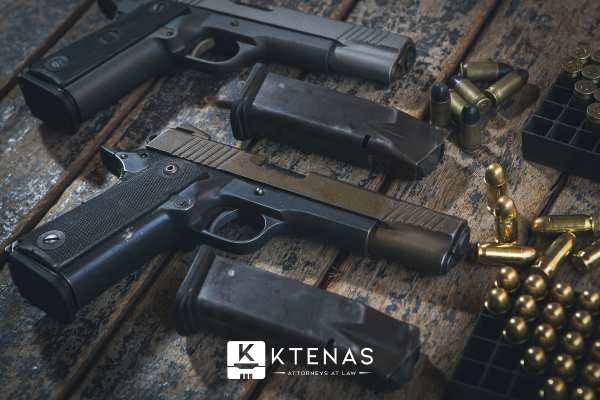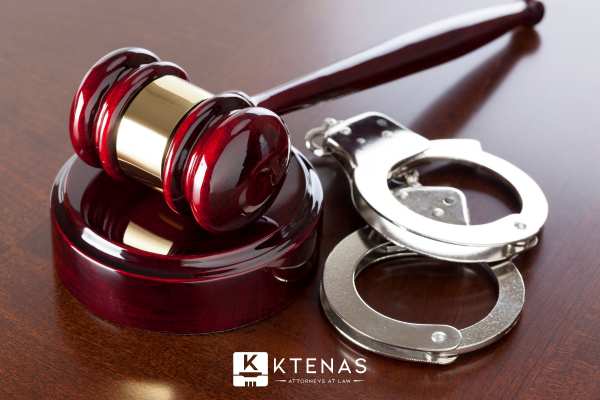Can You Legally Record Police Officers?
11/09/2025
In Illinois, the illegal sale or purchase of firearms is taken very seriously and carries significant legal consequences. Due to stringent state laws and efforts to curb gun violence, Illinois has established strict regulations governing who can sell, buy, and possess firearms. These laws are designed to ensure that firearms do not fall into the wrong hands, and violations can lead to severe penalties including hefty fines and substantial prison time.
If you find yourself facing charges related to the illegal sale or purchase of a firearm in Illinois, it’s essential to seek experienced legal counsel immediately. Navigating the complexities of firearm laws and the criminal justice system requires a deep legal understanding, particularly in a state with such rigorous enforcement.
Call Ktenas today at (312) 756-8652 to discuss your case with a skilled gun charge attorney in Chicago. Let us help you understand your legal options and work towards the best possible outcome in your case.
Illinois has some of the stricter firearm regulations in the United States, governed by both state statutes and local ordinances, especially in cities like Chicago. Understanding these laws is crucial for residents and visitors alike to ensure they comply with all legal requirements and maintain their rights to gun ownership and use. Here’s an overview of the key aspects of Chicago’s firearm laws:
To legally possess or purchase firearms and ammunition, residents must have a FOID card, issued by the Illinois State Police to applicants who pass a background check. This card is a basic requirement, without which possession of a firearm is illegal.

Illinois is a “shall issue” state for concealed carry licenses, meaning that the state must issue a license if the applicant meets all legal conditions. Applicants must complete a 16-hour training course—the longest mandatory training requirement in the U.S.—and pass a subsequent background check.
Illinois imposes a waiting period for firearm purchases—72 hours for handguns and 24 hours for rifles and shotguns. This is intended to provide a “cooling off” period to help prevent impulsive violence or suicides.
Background checks are mandatory for all firearm sales, including private transactions. Private sellers must verify the buyer’s FOID card and maintain a record of the sale for at least 10 years.
Illinois requires that firearms be stored unloaded and secured with a trigger lock, placed in a locked container, or stored in a location that a reasonable person would believe to be secure, especially if the owner knows or has reason to believe that a minor under 14 could gain access without parental permission.
For those without a CCL, firearms must be transported unloaded, and enclosed in a case, firearm carrying box, shipping box, or other container. Firearms that are not broken down in a non-functioning state or not immediately accessible are also considered compliant.
Even with a CCL, there are locations where carrying firearms is prohibited, such as schools, government buildings, parks, and establishments where alcohol makes up more than 50% of the business’s gross sales. Additionally, private property owners can prohibit firearms on their premises with a legally required sign.
Chicago has additional regulations, including a ban on assault weapons and high-capacity magazines. The city also has specific zoning laws that restrict where gun stores can operate and how they conduct business. These laws reflect a comprehensive approach to gun control, aimed at balancing the rights of responsible gun owners with the need to reduce gun violence and ensure public safety.
Learn More: Common Types of Gun Charges
Anyone dealing with firearm-related legal issues, seeking to understand their rights under Illinois law, or facing charges related to firearms should consider consulting with a knowledgeable attorney who works in this area. This guidance is crucial for navigating the complexities of Illinois’ firearm laws effectively.
In Illinois, the sale of firearms is governed by strict state laws designed to regulate both licensed dealers and private sellers. These regulations are in place to ensure that all firearm transactions are conducted safely and legally, with thorough background checks and proper documentation. Here’s an overview of the legal requirements for selling guns in Illinois:
All gun dealers in Illinois must have a valid Federal Firearms License issued by the Bureau of Alcohol, Tobacco, Firearms and Explosives (ATF). This license is necessary for selling firearms commercially.
As of 2019, Illinois requires all gun dealers to also obtain a state dealer license under the Firearm Dealer License Certification Act. This state certification involves additional regulations, including employee training, store security measures, and record-keeping practices.
Both FFL dealers and private sellers are required to conduct background checks on potential buyers. This involves verifying the buyer’s Firearm Owner’s Identification (FOID) card, which ensures that the buyer is legally eligible to own a firearm in Illinois.
Sellers must contact the ISP to conduct the background check, which will confirm whether the buyer’s FOID card is valid and if there are any disqualifying conditions that would prevent the firearm sale.
Illinois imposes a mandatory waiting period for all firearm purchases, which is intended to provide a cooling-off period that might deter impulsive violence or suicides:
Sellers are required to maintain records of all firearm sales. This documentation must include detailed information about the firearm and the buyer and must be retained for a minimum of 10 years.

In addition to maintaining sales records, sellers must also report the sale to local law enforcement agencies, providing another layer of oversight.
Even private sellers, who are not licensed dealers, are required to verify the buyer’s FOID card and complete a background check through the Illinois State Police.
Private sellers must also keep a record of all firearm transfers, including information on the firearm and the buyer, for at least 10 years.
Certain individuals are prohibited from purchasing or possessing firearms under Illinois law, including those with a criminal record, mental health disqualifications, or those under restraining orders for threats or violence. Sellers must ensure they do not knowingly sell firearms to these individuals.
Compliance with these regulations is critical for all parties involved in the sale of firearms in Illinois. Violations can lead to severe penalties, including fines and imprisonment. For individuals navigating the complexities of firearm sales, whether as buyers or sellers, consulting with a knowledgeable attorney can provide essential guidance and help ensure that all legal requirements are met.
Providing false information on a Firearm Owner’s Identification (FOID) card application in Illinois is a serious offense that can lead to severe legal consequences. The FOID card system is designed to ensure that individuals who own, possess, or purchase firearms and ammunition are legally eligible to do so. Here is what happens if someone provides false information on their FOID card application:
Providing false information on a FOID card application is considered perjury under Illinois law. Perjury is a Class 3 felony, which carries potential penalties including imprisonment for 2 to 5 years, probation, and significant fines.
Depending on the nature of the false information, additional charges could be applicable, such as fraud or forgery.
Any discrepancies or falsehoods found in the application will lead to an immediate denial of the FOID card. This denial not only affects the current application but can also impact the applicant’s ability to obtain a FOID card in the future.
If an individual who already holds a FOID card provides false information in an attempt to renew or alter their card, the existing FOID card can be revoked.
Providing false information can also affect the status of an Illinois Concealed Carry License (CCL), as the integrity of information is crucial for both types of firearm licenses.
If a FOID card application is denied due to alleged false information, the applicant has the right to appeal the decision. During the appeal process, presenting a defense or clarification regarding the information in question can be crucial.
Given the severe implications of providing false information on a FOID card application, consulting with a knowledgeable attorney is advisable. An attorney can provide guidance, represent the accused in court, and help navigate the appeal process if the application is denied.
Given these potential consequences, it is crucial to provide accurate and truthful information when applying for a FOID card in Illinois. If you’re unsure about the application process or if you’re facing legal issues related to a FOID card, seeking professional legal help is highly recommended to protect your rights and future access to firearms.
In Illinois, the illegal sale and purchase of firearms are serious offenses, governed by stringent laws designed to prevent gun violence and ensure public safety. Those found in violation of these laws face severe penalties, including fines, imprisonment, and long-term restrictions on their ability to legally own or possess firearms. Here’s a detailed look at the penalties for illegal firearm sales and purchases in Illinois:
Selling firearms without a valid Federal Firearms License (FFL) or failing to adhere to the rules governing private sales can lead to significant legal consequences. This includes selling firearms to individuals who do not possess a valid Firearm Owner’s Identification (FOID) card or those otherwise prohibited from owning firearms.
Purchasing a firearm without a FOID card, or providing false information to obtain one, is also a criminal offense. This includes purchasing firearms on behalf of someone else in a practice known as “straw purchasing.”

The illegal sale or purchase of firearms is typically charged as a felony in Illinois. The severity of the gun violation can result in felony charges.
Individuals convicted of illegal firearm sales may face revocation of their FFL or any business licenses related to the sale or manufacture of firearms. This revocation can be permanent, barring the individual from legally selling firearms in the future.
Convictions for gun trafficking or illegal sales might result in a lifelong prohibition on firearm ownership or possession, not just in Illinois but nationwide, as per federal law.
Given the complex and strict nature of firearm laws in Illinois, individuals involved in the sale or purchase of firearms must ensure they are in full compliance with all legal requirements. If you are facing charges related to illegal firearm sales or purchases, it is crucial to seek experienced legal representation immediately. A qualified attorney can help navigate the legal system, advocate on your behalf, and potentially mitigate the severe consequences associated with these charges.
Navigating the consequences of illegal firearm sales in Illinois can be daunting due to the stringent laws and severe penalties involved. Whether you are accused of selling firearms without proper licensing or purchasing them unlawfully, the implications can be significant, affecting your freedom, financial stability, and future rights to firearm ownership. Understanding your legal rights and the defenses available to you is crucial in such serious legal matters.
If you find yourself facing charges related to the illegal sale or purchase of firearms in Illinois, it’s essential to act swiftly and seek professional legal assistance. An experienced criminal defense attorney with experience in firearm laws can provide you with the guidance and representation needed to navigate this complex legal landscape.
Our Chicago defense lawyers are equipped with the knowledge and resources to defend your case effectively, aiming to achieve the best possible outcome. Contact us today for a consultation to discuss your situation, understand your legal options, and start building a robust defense. Let us help you protect your rights and ensure that you are treated fairly under the law.

